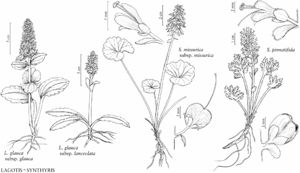Lagotis glauca subsp. lanceolata
J. Bot. Res. Inst. Texas 4: 220. 2010.
Basal leaves 2–17 cm; blade narrowly oblanceolate, 12–70 × 12–30 mm, base cuneate, margins entire or dentate to serrate, apex obtuse or subacute, sometimes acute. Cauline leaves: blade lanceolate, margins entire or dentate to serrate. Flowers: filaments 2+ mm, longer than anthers. 2n = 22.
Phenology: Flowering summer.
Habitat: Tundra meadows, tussock tundra, seeps, moist screes, margins of shallow tundra pools.
Elevation: 0–1800 m.
Distribution
N.W.T., Yukon, Alaska, Asia (Russian Far East), Asia (Siberia)
Discussion
Where subsp. glauca and subsp. lanceolata are sympatric, there is local separation by habitat preferences. Subspecies lanceolata occurs farther north and eastward along the Arctic coastal plain, Arctic foothills, and Brooks Range southward to the mountain ranges of interior Alaska, arctic and interior Yukon, and westernmost Northwest Territories.
W. J. Cody (1966), E. Hultén (1968), and V. V. Petrovsky (1980) all misapplied the name subsp. minor (Willdenow) Hultén to plants of subsp. lanceolata. Subspecies minor is typified on tetraploid (2n = 44) plants, ones probably from the lower Lena River, which are otherwise found in northeastern Europe, European Russia, and Siberia, but do not reach the Russian Far East or North America.
Gjaerevoll proposed, but did not validly publish, Lagotis glauca subsp. stelleri in 1967, based on Gymnandra stelleri Chamisso & Schlechtendal, a name itself published twice and which cannot be clearly linked to this taxon (D. F. Murray et al. 2010). The legitimate var. lanceolata by Hultén has a diagnosis that refers unambiguously to a northern amphi-Beringian plant.
Selected References
None.
Lower Taxa
"elongating" is not a number.
